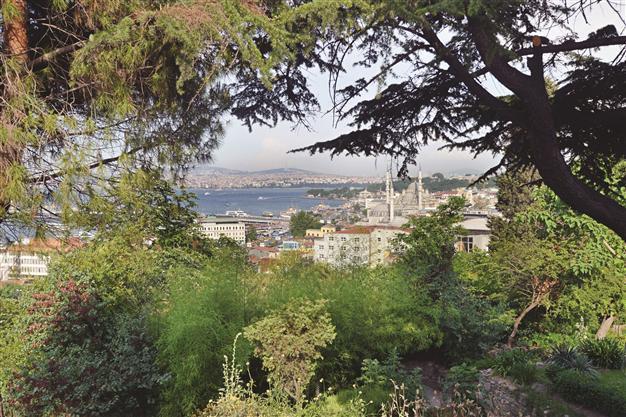Botanic Park’s seizure by Istanbul Mufti’s Office stirs debate
ISTANBUL - Hürriyet Daily News

Istanbul University’s Botanic Garden has been collecting different species since 1933 – this makes it more precious, experts say. The garden’s unique Golden Horn and Bosphorus view makes it charming. DAILY NEWS photo / Emrah Güler
Istanbul University’s Botanic Garden will be allocated to the Istanbul Mufti’s Office, the university’s rector has said about a development that has raised worries among academics.
Rector Yunus Söylet told a talk show in April that the garden might be moved elsewhere as the mufti’s office wants to regain the property, adding that the prime minister wanted to revive history there, meaning that a historical building could be rebuilt on the site.
“Six months ago, I had doubts [about this project] too. But the head of Religious Affairs Directorate showed me a photo [which proves that] this place [garden] belonged to the office of the Shaykh al-Islam [the top Islamic authority in Ottoman times]. But it has been used by the university as a botanical garden for the past 60 years. We have to consider this and find a balanced solution,” said Söylet.
On May 29, Söylet wrote on Twitter that the Religious Affairs Directorate had been demanding the garden from the university for the past eight years following a question from a student. The university did not respond to the Hürriyet Daily News’ request for information on the issue.
After Söylet’s remarks, a number of students, academics and activists gathered at a panel in Istanbul to discuss the significance of the garden for science and to voice their demands that the garden be maintained. Several academics are still waiting for a response from the rector’s office for an appointment in which they expect to express the importance of the garden to science.
Istanbul University’s Alfred Heilbronn Botanic Garden was established near Süleymaniye Mosque in 1933, by Alfred Heilbronn and Leo Brauner, two Jewish professors who escaped Nazi Germany for Turkey. Erdal Üzen, an academic who has worked at the garden for many years, says the uprooting of such plants would cause damage to them. The botanical garden in Süleymaniye includes around 3,000 different plant species and 1,000 different tree species that function as a record of all the species found in Anatolia. The Turkey’s Biologists Association’s Istanbul bureau head, İlbay Kahraman, warned that the uprooting would cause great damage to the school and garden. Kahraman said he was worried that the property might be privatized and allocated for a hotel, residence or mall project, noting that the location was whetting private firms’ appetite due its beautiful view of the Golden Horn and the Bosphorus. “The botanical gardens help us determine biological changes. This garden has been collecting different species since 1933 – this makes it more precious,” he said.
